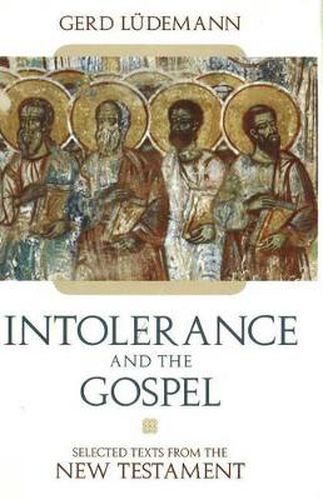Readings Newsletter
Become a Readings Member to make your shopping experience even easier.
Sign in or sign up for free!
You’re not far away from qualifying for FREE standard shipping within Australia
You’ve qualified for FREE standard shipping within Australia
The cart is loading…






Contemporary Christians usually suppose that Christianity is quite congenial to the democratic ideals that are the basis of free, open Western societies. Among these ideals is freedom of religion, which encourages a broad tolerance for different belief systems. Nonetheless, a careful examination of core Christian beliefs and the history of Christianity reveal little tolerance for thinking or acting outside the orthodox Christian tradition. In this enlightening analysis of key New Testament texts, historian of early Christianity Gerd Ludemann discusses the inherently intolerant attitude that has characterised monotheistic belief systems generally and Christianity in particular. As Ludemann points out, Christianity evolved within the context of the pluralistic Roman Empire, which generally allowed separate belief systems as long as political allegiance to the Roman state was never questioned. Ironically, Christians inherited their essential intolerance from Judaism, whose first commandment is the expression of a jealous God: I am the Lord your God . Thou shalt have no other gods before me . After Christianity became the state religion of Rome, tolerance disappeared and did not reappear on the world stage until the European Enlightenment of the 18th century. Besides the discussion of these issues, Ludemann presents a textual analysis in five chapters of some of the letters in the New Testament . In each case he translates the letter, presents textual commentary, and demonstrates how the text reflects Christian intolerance of heretics and non-believers. In conclusion, Ludemann suggests that attempts to harmonise Christianity with the democratic ideal of tolerance cannot really work because there is a logical contradiction between monotheism and Christology, on the one hand, and the core values of a pluralistic society, on the other.
$9.00 standard shipping within Australia
FREE standard shipping within Australia for orders over $100.00
Express & International shipping calculated at checkout
Contemporary Christians usually suppose that Christianity is quite congenial to the democratic ideals that are the basis of free, open Western societies. Among these ideals is freedom of religion, which encourages a broad tolerance for different belief systems. Nonetheless, a careful examination of core Christian beliefs and the history of Christianity reveal little tolerance for thinking or acting outside the orthodox Christian tradition. In this enlightening analysis of key New Testament texts, historian of early Christianity Gerd Ludemann discusses the inherently intolerant attitude that has characterised monotheistic belief systems generally and Christianity in particular. As Ludemann points out, Christianity evolved within the context of the pluralistic Roman Empire, which generally allowed separate belief systems as long as political allegiance to the Roman state was never questioned. Ironically, Christians inherited their essential intolerance from Judaism, whose first commandment is the expression of a jealous God: I am the Lord your God . Thou shalt have no other gods before me . After Christianity became the state religion of Rome, tolerance disappeared and did not reappear on the world stage until the European Enlightenment of the 18th century. Besides the discussion of these issues, Ludemann presents a textual analysis in five chapters of some of the letters in the New Testament . In each case he translates the letter, presents textual commentary, and demonstrates how the text reflects Christian intolerance of heretics and non-believers. In conclusion, Ludemann suggests that attempts to harmonise Christianity with the democratic ideal of tolerance cannot really work because there is a logical contradiction between monotheism and Christology, on the one hand, and the core values of a pluralistic society, on the other.